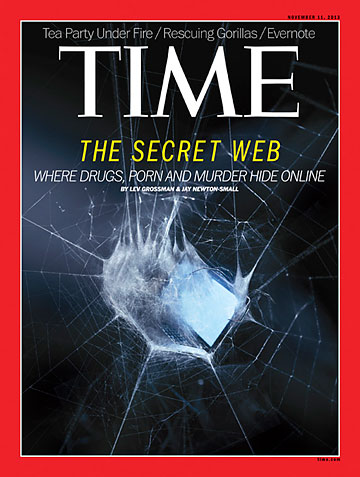
On the afternoon of Oct. 1, 2013, a tall, slender, shaggy-haired man left his house on 15th Avenue in San Francisco. He paid $1,000 a month cash to share it with two housemates who knew him only as a quiet currency trader named Josh Terrey. His real name was Ross Ulbricht. He was 29 and had no police record. Dressed in jeans and a red T-shirt, Ulbricht headed to the Glen Park branch of the public library, where he made his way to the science-fiction section and logged on to his laptop--he was using the free wi-fi. Several FBI agents dressed in plainclothes converged on him, pushed him up against a window, then escorted him from the building.
The FBI believes Ulbricht is a criminal known online as the Dread Pirate Roberts, a reference to the book and movie The Princess Bride. The Dread Pirate Roberts was the owner and administrator of Silk Road, a wildly successful online bazaar where people bought and sold illegal goods--primarily drugs but also fake IDs, fireworks and hacking software. They could do this without getting caught because Silk Road was located in a little-known region of the Internet called the Deep Web.
Technically the Deep Web refers to the collection of all the websites and databases that search engines like Google don't or can't index, which in terms of the sheer volume of information is many times larger than the Web as we know it. But more loosely, the Deep Web is a specific branch of the Internet that's distinguished by that increasingly rare commodity: complete anonymity. Nothing you do on the Deep Web can be associated with your real-world identity, unless you choose it to be. Most people never see it, though the software you need to access it is free and takes less than three minutes to download and install. If there's a part of the grid that can be considered off the grid, it's the Deep Web.
The Deep Web has plenty of valid reasons for existing. It's a vital tool for intelligence agents, law enforcement, political dissidents and anybody who needs or wants to conduct their online affairs in private--which is, increasingly, everybody. According to a survey published in September by the Pew Internet & American Life Project, 86% of Internet users have attempted to delete or conceal their digital history, and 55% have tried to avoid being observed online by specific parties like their employers or the government.
But the Deep Web is also an ideal venue for doing things that are unlawful, especially when it's combined, as in the case of Silk Road, with the anonymous, virtually untraceable electronic currency Bitcoin. "It allows all sorts of criminals who, in bygone eras, had to find open-air drug markets or an alley somewhere to engage in bad activity to do it openly," argues Preet Bharara, U.S. attorney for the Southern District of New York, whose office is bringing a case against Ulbricht and who spoke exclusively to TIME. For 2½ years Silk Road acted as an Amazon-like clearinghouse for illegal goods, providing almost a million customers worldwide with $1.2 billion worth of contraband, according to the 39-page federal complaint against Ulbricht. The Dread Pirate Roberts, the Deep Web's Jeff Bezos, allegedly collected some $80 million in fees.
